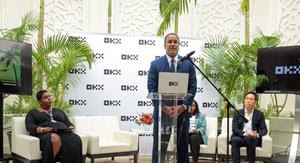OKX Bahamas is the latest milestone in the company’s global expansion to regulated markets
Ianthe Tynes, Senator the Hon. Michael B. Halkitis, Dr. Jillian Bethel, and Tim Byun
NASSAU, The Bahamas, Nov. 03, 2022 (GLOBE NEWSWIRE) — OKX, the world’s second largest crypto exchange by volume and a leading web3 platform, today announced its registration as a Digital Asset Business in The Bahamas under the newly adopted Digital Assets and Registered Exchanges (DARE) Act. The company has also formed a new subsidiary, OKX Bahamas, for which it appointed Dr. Jillian Bethel, a Bahamian native and blockchain industry luminary, as CEO. With plans to serve as a regional hub, OKX Bahamas has opened a Nassau-based office and plans to fill 100 job openings locally.
This latest milestone comes during a period of significant growth for OKX, which is trusted by more than 20 million global customers in 180 markets with its monthly spot trading volume averaging over $84 billion year-to-date. The OKX Bahamas regional hub will cater to the area’s growing population of cryptocurrency investors and traders, such as those in Latin America and the Caribbean, where digital assets are increasingly becoming part of local economies.
“OKX is thrilled about our expansion into The Bahamas under the innovative DARE Act,” said Tim Byun, Global Government Relations Officer, OKX. “We are prioritizing growth in regulated markets because we want to enable responsible crypto activity globally. By working with forward-looking authorities like the Securities Commission of The Bahamas, we can create safe and sustainable environments for crypto to exist.”
OKX selected The Bahamas as a strategic growth location because of the effective regulatory framework created by the Securities Commission of The Bahamas. Already known as a prestigious international business and financial center, The Bahamas is emerging as a global leader in digital assets through its progressive legislation and regulatory structures.
Senator the Hon. Michael B. Halkitis, Minister of Economic Affairs and Leader of Government Business in the Senate

Senator the Hon. Michael B. Halkitis, Minister of Economic Affairs and Leader of Government Business in the Senate
“The DARE Act has made The Bahamas a pioneer in digital asset adoption, and I’m proud to lead the OKX Bahamas team in championing crypto,” said Dr. Jillian Bethel, OKX Bahamas CEO. “As a gateway to the Caribbean and the broader Americas, The Bahamas is opening new doors for local talent and global businesses to thrive here with forward-looking policy.”
This registration in The Bahamas comes on the heels of OKX receiving a provisional Virtual Assets Regulatory Authority (VARA) license in Dubai, where it has also opened a regional hub to serve qualified investors within the UAE and surrounding countries.
Dr. Jillian Bethel, OKX Bahamas CEO
OKX is pursuing licenses across the world as part of its mission to empower responsible crypto trading and investing globally. Beyond licensure, OKX aims to drive responsible crypto and web3 adoption through a range of high-profile partnerships, including those with English Premier League champions Manchester City FC, McLaren Formula 1, golfer Ian Poulter, olympian Scotty James, and F1 driver Daniel Ricciardo. Further, OKX provides resources like OKX Learn, as it prioritizes user protection and the safeguarding of customer assets in its effort to make crypto accessible to all.
For further information, please contact:
Media@okx.com
About OKX
OKX is the second largest global crypto exchange by trading volume and a leading web3 ecosystem. Trusted by more than 20 million global customers, OKX is known for being one of the fastest and most reliable crypto trading apps for investors and professional traders everywhere.
As a top partner of English Premier League champions Manchester City FC, McLaren Formula 1, golfer Ian Poulter, olympian Scotty James, and F1 driver Daniel Ricciardo, OKX aims to supercharge the fan experience with new financial and engagement opportunities. OKX is also a presenting partner of the Tribeca Festival as part of an initiative to bring more creators into web3.
Beyond the OKX trading app, the OKX Wallet is the platform’s latest offering for users looking to explore the world of NFTs and the metaverse while trading GameFi and DeFi tokens.
To learn more about OKX, download our app or visit: okx.com
Photos accompanying this announcement are available at:
https://www.globenewswire.com/
https://www.globenewswire.com/
https://www.globenewswire.com/

GlobeNewswire Distribution ID 8688952



